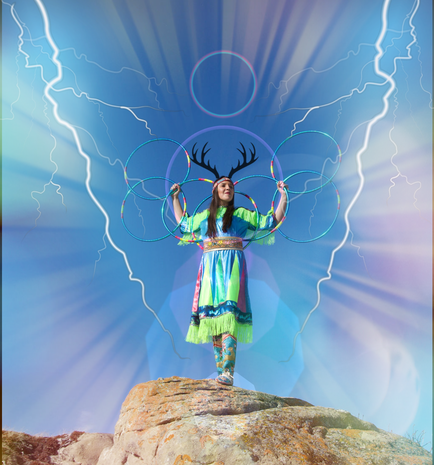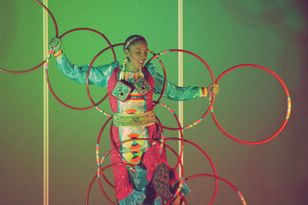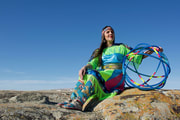|
Have you ever thought about the power of a name? I grew up in Slave Lake, Alberta, a name that comes from the Slavey people a name of European origin that is derogatory, or at best misappropriation. The name 'Slavey' refers to people who call themselves Denѐ, which translates simply to 'people'. Their are stories like this all over Turtle Island...
The name my parents gave me 'Sandra' means defender of man or helper of humanity, which is actually very appropriate if you know me. My last name Lamouche, meaning 'the fly' was given to my great grandfather because he was a hard worker, it was a nickname. Later, the missionaries told him it was because he was so insignificant, like a fly. My Blackfoot name, Itamspiakii, translates to Happy Dancing Woman and comes from the deer family. This name has many meanings- It is a reminder to be happy and think positive. It is motivation and encouragement to keep dancing, to not give up. It carries the meaning of what a woman is to Indigenous peoples, including culture carrier and life giver. The deer is a graceful and gentle creature, which I try to embody in my dance and everyday life, this also connects me to this land, and to the natural world. This name carries so much guidance, wisdom and resilience. At one time all over North America we only had our Indigenous names, which were not only spiritual and sacred, but they were also inspiring and empowering. Names could be passed on from your relatives and ancestors, with the expectation that you live up to that name and the greatness and achievements of the person who carried the name before you, as is the case with my two sons. Your name could change over your lifetime, therefore your identity could change. Through your achievements and actions could earn an appropriate name. In essence, the family or situation you were born into did not predict your path in life, you could persevere and overcome, you could change your life and your resilience was honored. The name of the first hoop dancer in the Ojibway story is 'Pukawiss' which means the disowned one, they say nobody remembers his real name. Despite being disowned Pukawiss creates the hoop dance and makes a name for himself (no pun intended) as a renowned artist, storyteller and performer. His actions speak louder than his name and his legacy remains a powerful part of Indigenous identity to this day. Indigenous names are an important part of building resilience. "Resilience is the process of adapting well in the face of adversity, trauma, tragedy, threats or significant sources of stress — such as family and relationship problems, serious health problems or workplace and financial stressors. It means "bouncing back" from difficult experiences (source)". In Canada, Indigenous peoples were systematically given European names through assimilation policies, in some cases, such as residential schools Indigenous people were sometimes given numbers to replace their names. Reclaiming Indigenous names does not only build resilience it also a step towards reconciliation. As the Truth and Reconciliation Call to Action #17 states: "We call upon all levels of government to enable residential school Survivors and their families to reclaim names changed by the residential school system by waiving administrative costs for a period of five years for the name-change process and the revision of official identity documents, such as birth certificates, passports, driver’s licenses, health cards, status cards, and social insurance numbers" Indigenous peoples are reclaiming Indigenous names all over, from personal names to community names and names of nations as an important act of reconciliation and resilience, and also an important way to take back our power as people and nations, for healing, self-determination and sovereignty.
0 Comments
In March 2018 I celebrated ten years of sobriety. A decade of living drug and alcohol free as an adult. This decision was a direct result of learning to hoop dance. As I started on this journey of dance and culture I was told that if I participated in my culture I was representing my culture to others, I would be a role model. I believe that all those who practice their culture, dance, song, ceremony, arts and storytelling are all powerful role models. When you share your culture you are an advocate for your people. Others look towards you as a conduit for connecting to culture.
In the story of the hoop dance, because it is a healing dance, it is a great responsibility to become a hoop dancer. To represent the circle of life, you are representing life and all that it means to grow, thrive, and live in wellness. In the original ceremony of the hoop dance, the hoop dancer dances with the hoop and returns it to the person seeking healing as a message that they are responsible for their own healing. Thus, the hoop dancer, who cares for their own hoops, is responsible for their own continual healing. This includes spiritual, physical, emotional and mental well-being, as the symbol of the hoop encompasses the four directions and teachings of the Medicine Wheel. Indeed, one of the hoop dance teachings is that how many hoops you can handle, reflects how you handle the different challenges within your life. For those who strive to be culturally grounded and focused artists our practice reaches far beyond the stage, screen, or canvas into everyday life, and everyday practices of self-care, taking care of our body, listening to our emotions, monitoring our thoughts, our relationships, and wellness. When you are an artist, when you share your culture, when you are a role model it is a great responsibility. To show the sacredness of an ancient culture you must also practice the the teachings. When we choose to practice these teachings we are showing respect to our culture and to our teachers. To respect ourselves is to also respect the culture we carry, our ancestors who carried it in the past, and the future ancestors who will carry it forward long after we are gone. What the past ten years have taught me is that healing is not a life-long journey, but life is a healing journey. We are all healing from something, we are all imperfect and this is part of the circle of life. |
Nehiawsko Pikiskwew'Cree Woman Speaking' is a space to share my voice. My goal is to spread awareness and share wisdom as I learn and grow as a dancer, choreographer, and woman. My passion is to show the healing power of dance and culture. I love learning from elders, experience, and research and being able to synthesize Native and non-Native ways of knowing! Archives
November 2023
Categories
All
|


